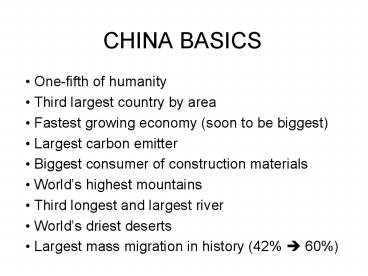CHINA BASICS - PowerPoint PPT Presentation
1 / 25
Title:
CHINA BASICS
Description:
Paper invented. Buddhism introduced from India. Tang Dynasty. 618 907. Capital Xi'an ... Gunpowder, compass, porcelain. Yuan Dynasty. 1279 1368. Capital ... – PowerPoint PPT presentation
Number of Views:74
Avg rating:3.0/5.0
Title: CHINA BASICS
1
CHINA BASICS
- One-fifth of humanity
- Third largest country by area
- Fastest growing economy (soon to be biggest)
- Largest carbon emitter
- Biggest consumer of construction materials
- Worlds highest mountains
- Third longest and largest river
- Worlds driest deserts
- Largest mass migration in history (42 ? 60)
2
NORTHERN FORESTS
Pobedy 24406ft
MONGOLIAN RIM
TAKLIMAKAN AND GOBI DESERTS
K2 28250ft
Muztag 25338ft
EASTERN LOWLANDS
TIBETAN PLATEAU
CENTRAL MOUNTAINS
Gonggashan 24790ft
Everest 29028ft
SOUTHERN UPLANDS
3
Dongguan
Hong Kong
4
Shang Dynasty1766 B.C. 1122 B.C.Capital --
Anyang
- magnificent bronze vessels
- horse-drawn war chariots
- system of writing
- elite class and peasant class
- tombs contain human sacrifices
5
Zhou Dynasty1122 B.C. 256 B.C.Capitals
Xian, Louyang
- many semi-independent lords
- Confucius -- personal morality 500B.C.
- Laozi -- Daoism natural feelings
- warring states
- Iron, infantry, currency
- feudalism and land ownership
6
Qin Dynasty221 B.C. 206 B.C.Capital Xian
- Qin defeated all their rivals
- Shi Huangdi, ruler in movie Hero
- First ruler of a united China
- Strong central government
- 7000 terracotta warriors in Xian
- Standardized writing
7
Han Dynasty206 B.C. 220 A.D.Capital Xian
- Confucian values ingrained
- Han Wudi defeated the Huns
- Silk road route to Europe
- Paper invented
- Buddhism introduced from India
8
Tang Dynasty618 907Capital Xian
- Xian 1,000,000 people
- Largest city in the world
- Traders, poets, scholars, artists
- Government bureaucracy
- Only female ruler Wu Zetian
- Eunuchs and political intrigue
9
Song Dynasty960 1279Capitals Kiafeng,
Hangzhou
- Foreign trade, urbanization, navy
- Early ripening rice
- Movable type, printed books
- Civil service examinations
- Population 100,000,000
- Gunpowder, compass, porcelain
10
Yuan Dynasty1279 1368Capital Beijing
- Mongols from the north
- Kublai Khan ruled harshly
- Ghengis Khans grandson
- Marco Polo visits from Venice
- Grand Canal repaired
- Empire from China to Europe
11
Ming Dynasty1368 1644Capitol Nanjing,
Beijing
- Looked down on all foreigners
- Yongle moved capitol to Beijing
- Yongle Encyclopedia
- Great wall reinforced
- Forbidden city built
- First European missionaries
12
Qing Dynasty1644 1911Capital Beijing
- Manchu foreigners
- Adopted Chinese ways
- All foreign trade via Guangzhou
- Missionaries cause havoc
- Lead to wars and rebellions
13
Opium Wars1839-1842
- Trade imbalance with Britain
- Smuggled opium to China
- China seized opium, jailed Britains
- Britain declared war, easily won
- Britain got Hong Kong
- Access to Shanghai
14
Taiping Rebellion1850-1864
- Lead by Hong Xiuquan who said he was the son of
the Christian God - Tried to exterminate Qing
- Capital at Nanjing
- West aids Qing to defeat Taiping
- 20 million deaths (US Civil 612,000)
15
War with Japan1894-1895
- Disastrous loss for China
- Lost Korea and Taiwan
16
Boxer Rebellion1900
- Yihetuan practiced martial arts
- Bloody attacks on westerners
- Secretly supported by Qing
- West puts down rebellion
- Qing publicly executes Boxers
17
Dr. Sun Yat-sen1911-1925
- Worked to overthrow Qing
- Republic established 1911, Nanjing
- May 4th Student Movement in 1919
- China dedicated for missionary 1921
- War lords struggle for power
- Sun organizes Nationalists
18
Chiang Kai-shek1925-1937
- Sun Yat-sen dies 1925
- Chiang Kai-shek ousts war lords
- Nationalist government 1928
- Mao Zedong leads communists on 6000-mile Long
March in 1935 - Civil War
19
World War II1937-1945
- Japan attacks Shanghai 1937
- Rape of Nanjing, 300,000 killed, denied
- Chiang Kai-shek in south, Mao in north
- 2,200,000 chinese dead
- Only USSR and Germany had more casualties
20
The Peoples Republic1945-1949
- Civil war resumes after WWII
- Chiang Kai-shek supported by USA
- Decisive battle on Yangzi river
- Chiang Kai-shek flees to Taiwan with treasures
- Mao Zedong proclaims a new nation
21
Mao Zedong1949-1976
- Rural reform (1 million killed)
- Great Leap Forward ruined economy
- 1960 famine (40 million died)
- Cultural revolution and Red Guard
- Destroyed art, books, temples, walls
- The Gang of Four became scapegoats
22
Deng Xiaoping1978-1992
- Reversed many of Maos policies
- Modernization and economic reform
- To get rich is glorious
- Special Economic Zones (SEZ)
- One child per family
- 1989 Tiananmen Square (7000 killed ??)
23
Jiang Zemin1993-2003
- B.S. Electrical Engineering
- Hong Kong and Macau returned 1997
- Socialist Market Economy
- Joined World Trade Organization
- Controlled media
- Urban-rural wealth gap
24
Hu Jintao2003-2009
- B.S. Hydraulic Engineering
- 2008 Olympics
- Balance economic and social issues
- Harmonious society
- Peaceful diplomacy
- Scientific perspective
25
2009 TIANANMEN SQUARE ANNIVERSARIES
- 20th Martial law imposed on students May 19 to
June 4, 1989 democracy crushed - 60th Mao Zedong pronounced The Chinese people
have stood up on October 1, 1949 start of
communism - 90th First public protest by students during the
May 4th Movement, 1919 end of dynasties


















![Market Report on China Valve Industry [2010-2019] PowerPoint PPT Presentation](https://s3.amazonaws.com/images.powershow.com/8328572.th0.jpg?_=20151214064)












